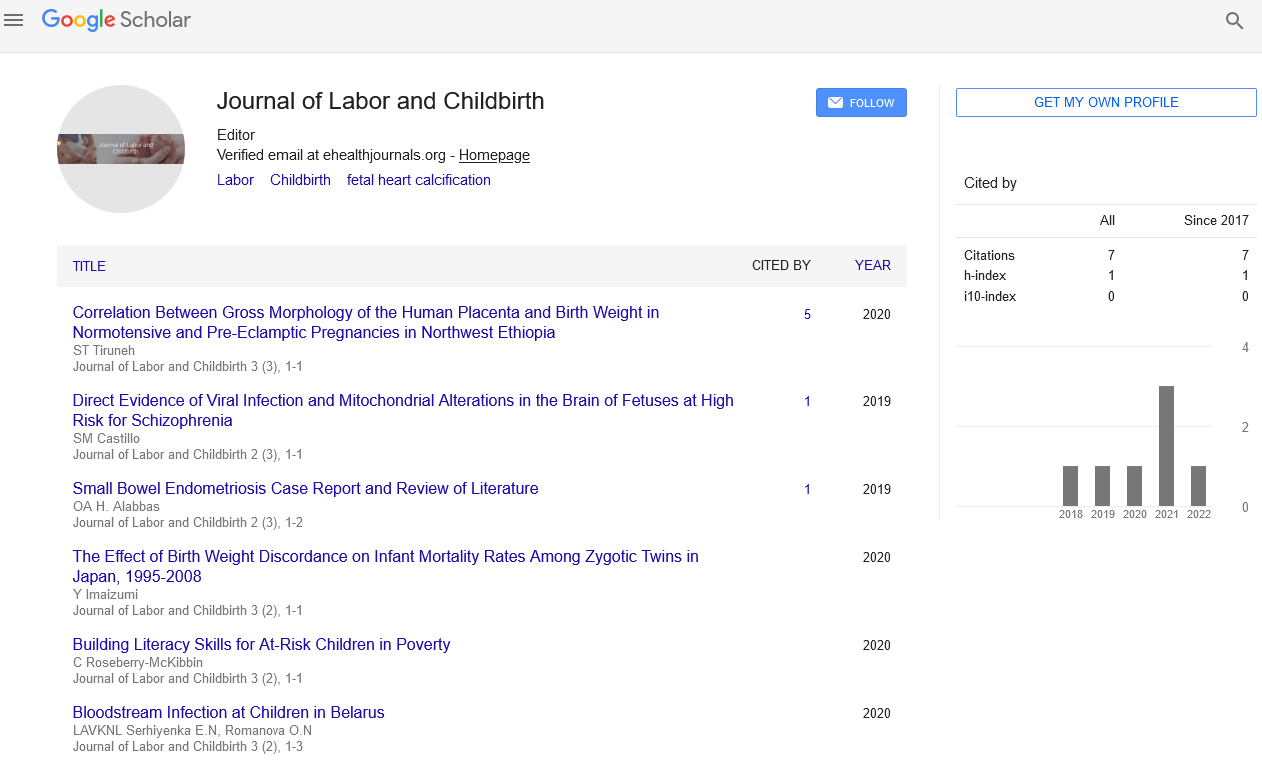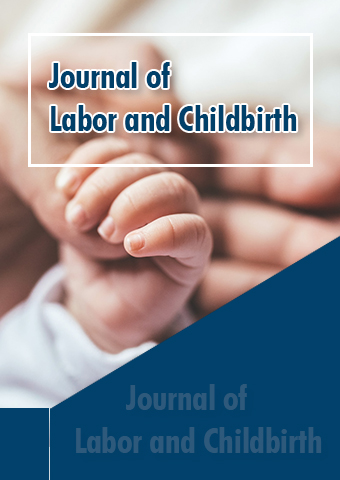Perspective - Journal of Labor and Childbirth (2024) Volume 7, Issue 1
Maternal Obesity: Understanding the Impact on Health and Pregnancy Outcomes
- Corresponding Author:
- Mina Jafari
Department of Gynecology,
Sheeraz University,
Shiraz,
Iran
E-mail: minajafari@sbmu.ac.ir
Received: 18-Jan-2024, Manuscript No. jlcb-24-125339; Editor assigned: 23-Jan-2024, PreQC No. jlcb-24-125339 (PQ); Reviewed: 06- Feb-2024, QC No. jlcb-24-125339; Revised: 15-Feb-2024, Manuscript No. jlcb-24-125339 (R); Published: 23-Feb-2024, DOI: 10.37532/ jlcb.2024.7(1).181-182
Introduction
Maternal obesity is a growing concern worldwide, with significant implications for both maternal and fetal health. As the rates of obesity continue to rise, understanding the effects of maternal obesity on pregnancy outcomes becomes crucial for healthcare providers, policymakers and expectant mothers. This article delves into the complexities surrounding maternal obesity, exploring its impact on fertility, pregnancy complications and long-term health implications for both mother and child.
Description
Defining maternal obesity
Maternal obesity is typically defined by a Body Mass Index (BMI) of 30 or higher before conception. BMI is a measure of body fat based on height and weight and obesity increases the risk of various health issues. With the global rise in obesity rates, the prevalence of maternal obesity has also increased, posing challenges to maternal and child health.
Fertility challenges
Obesity can affect a woman’s reproductive health, leading to fertility challenges. Irregular menstrual cycles, anovulation (lack of ovulation) and hormonal imbalances are common in obese women, making it difficult for them to conceive. Additionally, obesity is linked to Polycystic Ovary Syndrome (PCOS), a condition that further compounds fertility issues. As a result, women with obesity may face prolonged periods of infertility, requiring medical intervention to achieve pregnancy.
Impact on pregnancy complications
Once a woman with obesity becomes pregnant, the risks of complications rise significantly. These complications can affect both the mother and the developing fetus, requiring vigilant prenatal care. Some of the key pregnancy complications associated with maternal obesity include:
Gestational diabetes: Obese women are at a higher risk of developing gestational diabetes, a type of diabetes that occurs during pregnancy. This condition can lead to complications such as large birth weight, increased likelihood of cesarean delivery and a higher risk of developing type 2 diabetes later in life.
Hypertension and preeclampsia: Maternal obesity is a major risk factor for hypertensive disorders during pregnancy, including preeclampsia. These conditions can result in elevated blood pressure, proteinuria and organ damage, posing serious threats to both maternal and fetal well-being.
Preterm birth and low birth weight: Obese women have an increased risk of delivering preterm or having babies with low birth weight. Preterm birth and low birth weight are associated with various health challenges for the newborn, including developmental delays and an increased risk of chronic conditions later in life.
Birth defects: Research suggests a higher incidence of birth defects among infants born to mothers with obesity. Neural tube defects, heart defects and other structural abnormalities may be more prevalent in this population, emphasizing the importance of preconception health in obese women.
Cesarean section: Maternal obesity is linked to an increased likelihood of cesarean section deliveries. The excess body weight can make vaginal delivery more challenging, necessitating surgical intervention. Cesarean sections carry their own set of risks, including infection, blood loss and longer recovery times.
Long-term health implications
Maternal obesity doesn’t only impact pregnancy outcomes; it also has long-term health implications for both the mother and the child. Understanding these potential consequences is crucial for informed decision-making and preventive measures.
Maternal health risks: Women who experience obesity during pregnancy are at an increased risk of developing type 2 diabetes, cardiovascular diseases and metabolic syndrome later in life. Addressing maternal obesity is not only vital for immediate pregnancy outcomes but also for the long-term health and well-being of the mother.
Childhood obesity: Children born to mothers with obesity are at a higher risk of developing obesity and related health issues. The prenatal environment plays a significant r ole i n s haping a child’s future health and maternal obesity can contribute to an increased susceptibility to obesity, insulin resistance and metabolic disorders in offspring.
Inter-generational cycle of obesity: The impact of maternal obesity extends beyond a single generation, creating a potential intergenerational cycle of obesity and associated health problems. Breaking this cycle requires a holistic approach, focusing on both maternal health before and during pregnancy and the early childhood environment.
Addressing maternal obesity
Given the multifaceted challenges associated with maternal obesity, addressing this issue requires a comprehensive and collaborative approach. Here are some key strategies to tackle maternal obesity and improve pregnancy outcomes:
Preconception care: Promoting preconception health is essential for women of reproductive age, especially those with obesity. Providing guidance on nutrition, weight management and lifestyle changes before conception can improve fertility and reduce the risk of complications during pregnancy.
Antenatal monitoring: Pregnant women with obesity should receive specialized antenatal care to monitor and manage potential complications. Regular monitoring of blood pressure, blood sugar levels and fetal growth can help identify and address issues promptly.
Lifestyle interventions: Encouraging healthy lifestyle changes, including a balanced diet and regular physical activity, is crucial for managing maternal obesity. These interventions not only benefit the mother’s health but also contribute to improved pregnancy outcomes.
Multidisciplinary approach: A multidisciplinary healthcare team, including obstetricians, dietitians and mental health professionals, can provide comprehensive care for women with obesity. Tailoring interventions to individual needs and addressing both physical and mental well-being are essential components of effective care.
Education and support: Providing education and support to women with obesity can empower them to make informed choices about their health. Access to resources, counseling and community support can play a crucial role in promoting positive lifestyle changes.
Conclusion
Maternal obesity presents significant challenges to maternal and fetal health, impacting fertility, pregnancy outcomes and long-term health. Recognizing the complex interplay of factors involved in maternal obesity is essential for developing effective interventions and support systems. By prioritizing preconception care, implementing lifestyle interventions and fostering a multidisciplinary approach, healthcare providers can contribute to healthier pregnancies and improved long-term outcomes for both mothers and their children. Addressing maternal obesity is not just a matter of individual health but a public health imperative with far-reaching consequences for future generations.

